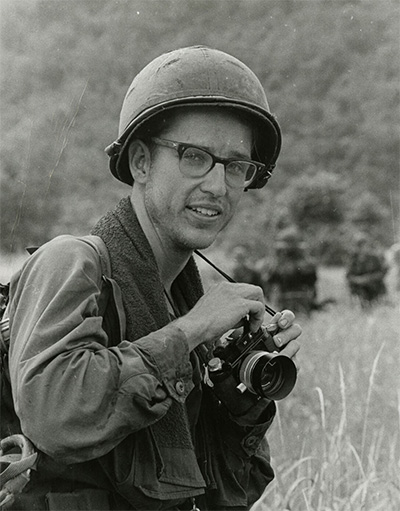This article originally appeared on page 8 of the No. 5 April 2025 edition of The Gettysburgian magazine
By Katie Lauriello, Managing Editor & Lead Copy Editor
Gettysburg College may not be known as the hub of student protest, but it has still made a mark in terms of freedom of expression. Through the Gettysburg College Publications Archive, which hosts fully searchable scans of The Gettysburgian from 1897 to 2010, one can get a snapshot of the conflict and protests at Gettysburg during the height of the Vietnam War.
On Nov. 11, 1966, a letter to the editor announced the formation of an ad-hoc committee of students who opposed the war in Vietnam, founded by Stephen H. Warner ’68. A former features section editor for The Gettysburgian, he was drafted for the war in 1969 and died on Feb. 14, 1971 in Vietnam.

Stephen H. Warner ’68 was killed while serving in Vietnam. (Photo via Musselman Library Special Collections)
In an April 21, 1967 publication titled “Week to Arouse Contrasting Vietnam Opinions,” The Gettysburgian announced that a Peace Week — hosted by the Ad Hoc Committee to End the War in Vietnam — would have activities throughout campus to mirror protests that had recently occurred during national Peace Week. Students quoted in the article expressed their skepticism about the event, given that the Ad Hoc Committee and hosts all viewed the war in Vietnam negatively and did not represent campus opinions as a whole.
Within articles of The Gettysburgian throughout 1968 to 1969, another battle was being waged in the texts of the newspaper alongside the battle in Vietnam. Throughout the year, Donald Brobst ’70 and Mike Klebanoff exchanged opinion after opinion on whether the United States should stay in Vietnam or withdraw. Another Peace Week was held in 1968, discussing both racial discrimination and the Vietnam war, with students encouraged to join in the National Student Strike outside of Glatfelter.
The Gettysburgian reported that on Oct. 15, 1969, over 500 “students, faculty, seminarians, and townspeople” marched together in silence from Lincoln Square to the Peace Light, one of the many events the Gettysburg community took part in for the Moratorium to End the War in Vietnam.
As anti-war rallies sparked all over the United States in the beginning of May 1970, Gettysburg had their own rallies as well. Reported on May 8 of that year, students participated in a two-day strike, and many faculty suspended classes as well. While the author believed the participation to be lackluster, they also believed that it was a necessary and powerful step to the ultimate goal of ending the war.
“We appeal to all students to make a conscious effort to understand the issues involved and to understand and acknowledge the rights of other individuals to their own views on these issues. It has been proved time and again that lack of understanding and tolerance does little else but increase tension and widen divisions that should not even be present in the first place,” said the writer.

Text from May 8, 1970 edition of The Gettysburgian newspaper, from an article titled “The Gettysburg Protest.”
Former editor-in-chief of The Gettysburgian Thomas H. Boll ’74 published “Yankee Come Home” on April 21, 1972, calling for an end to American involvement in Indochina. It won a Pi Delta Epsilon award in 1973.
After the announcement of President Nixon’s peace agreement and calling for American forces to withdraw, the Gettysburgian published a three-part retrospective of the Vietnam War, written by James Latta III ’73 from April 13 to May 4, 1973, going over the exact reason for America’s defeat.
He ends part three, published on May 4, 1973, discussing the consequences that the soldiers who have returned must deal with, as well as the memories they are left with, stating that there is no amount of money that can ever erase what they’ve done.
“The physical and mental reminders carried by these men can never be completely erased, despite increased pensions, V.A. benefits and Vietnam bonuses from a ‘grateful nation,’ nor can the consequences of their past actions be reassessed or reconstructed by conditional or general amnesty. How do these men destroy the nightmares, heartaches, and bitter frustrations of wasted years?”
